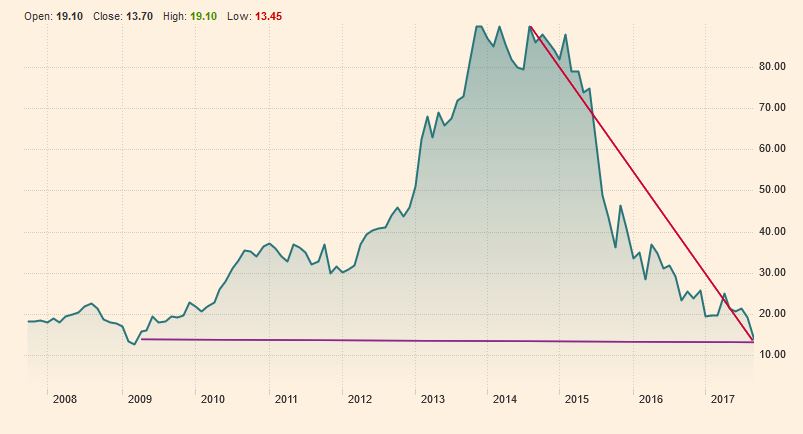This week the market weakened after last week’s mixed messages of blue chip weakness but overall recovery. Volume dipped to 136.1 million shares as compared to the previous week’s 188.3 millon (-27.7%). Total turnover followed suit recording movement of Kshs. 4.6 billion from Kshs. 5.7 billion (-20.1%). All the main indices closed in the red. The NSE 20 retreated to 3783.98 (-1.46%), the broad NASI slipped to 164.49 (-0.70%) while the NSE 25 dug itself deeper to 4307.07 (-0.40%).
Telecommunications Sector
Safaricom Kshs. 25.25 (-1.94%) saw the teleportation of 61,219,900 shares; gains evaporating like newly bought data bundles on the network! The telecommunications operator lost atleast Kshs. 400,000,000 in MPESA revenue due to the activity slump in the electioneering period. This was as inconvenient as another type of period, but thankfully a widespread bloodbath did not result from the violence breaking out after results declaration, as the ruckus was contained. However, the ‘stay at home’ mentality contributed to increased internet usage. The company has connected over 81,000 homes to its super-fast home fibre network, as the demand for internet increases due to the ‘work from home’ culture and compulsive use of services such as YouTube.
The ticker failed to close elevated, despite gravitating towards its all-time high during the week. Neither did it touch the aforementioned achievement, leaving pioneers succumbing to those exorbitant asks high and dry. Investors, especially foreign investors, have a number of worries:
- An Opposition victory may lead to unfavourable policies towards foreign investors and monopoly corporations
- Opposition MPs boycotted the opening of the new parliament by the President; shockingly, the judiciary was also conspicuously absent, leading to even greater worries regarding their political alignment.
- The Opposition are constantly throwing new demands and have threatened to boycott the October 17th elections, which may actually assist them in delegitimising the inclusivity of the single candidate that will be part of the election
- Continued fears of mass protests and violence due to the constant barrage of demands from the Lord of the Opposition
- The risk of a repeated nullification of the second presidential election 2017
- The risk of failure by the electoral body to meet the deadline and carry out the exercise in time
- A slowing economy leading to decreased profitability in most sectors, especially property
The Opposition leader on the other hand is actually helping to strengthen democracy by sealing loopholes in the election process and their manifesto points towards the potential of a very vibrant and fair government that will help create more jobs, increase exports, promote regional and international cooperation as well as barring those people, who are associated with state employees from doing business with the government, the final one being a major step towards curbing leaking revenue.
Banking Sector
KCB Kshs. 42 (-0.59%) traded 24,072,600 shares while Equity Bank Kshs. 39 (-0.64%) moved 18,005,100 shares. The CBK Governor set the stage for repeal of the rate caps. He stated that discipline will still be required in lending but the government is commited to free market policies. The process will need to be passed through parliament, however, MPs have rejected to repeal the controversial bill, capping intervention at amendment only. This is a political move as the large number of petitions against several victories in the court system may lead to some more repeat polls and the Presidential election is still pending. Even a canter is going to be hard for bank’s share prices under the scorching heat of political uncertainty, but it is still fordable territory.
Co-operative Bank Kshs. 16.60 (-0.91%) saw the exchange of 3,069,700 shares.
Commercial and Services
Kenya Airways Kshs. 4.75 (+4.40%) saw those holding its shares in their hangers experience their ears popping, as some altitude was gained. In the FY ended 30th March 2017, the airline took pride in recording an operating profit of Kshs 900Million compared to a loss of Kshs 4.1Billion last year, driven by a strong recovery strategy, Operation Pride. The Group’s loss after tax dropped sharply to KShs 10.2 billion compared to a loss of KShs 26.2 billion reported the prior year, an improvement of KShs 16 billion. The airline’s turnaround strategy, ‘Operation Pride’ continues to focus on three main priorities – returning to profitability through revenue enhancement and cost containment, refocusing and resizing the business model, and enhancing partnerships, as well as restructuring the capital of the company.
TPS Eastern Africa Kshs. 28 (+5.66%) saw 1,352,700 shares being served to new buyers while Uchumi Kshs. 3.90 (-1.27%) saw the barter of 162,600 shares.
Construction and Allied
ARM Kshs. 13.70 (-16.72%) traded 1,527,400 shares, constantly setting new 52-week lows during the week. If you look at a 10 year chart the current price levels of ARM Cement were last seen in the year 2009.
Bamburi Cement Kshs. 179 (-0.56%) experienced a transfer of 451,800 shares.
EA Cables Kshs. 5.80 (+3.57%) moved 129,700 shares. The counter has been a poor performer, still at levels it started the year off with. The company’s second CEO in two years, Peter Arina resigned in August. This coincided with a poor half year performance for the period ended 30th June 2017. EPS plunged from a microscopic Kshs. 0.01 per share to a loss of Kshs. -0.76 per share. When the fairly consistent loss maker will be turned around is questionable. Its book value of Kshs. 10.10 is still a beacon for the optimists.
Energy and Petroleum
KenolKobil Kshs. 16.60 (+0.30%) was the sector mover. The Group reported a 20% rise in net profit for the full year ended 30th December 2016 to Kshs. 2.41 billion from Kshs. 2 billion in 2015. Its gross margin increased to 7.1% from 6.7%. This was realised in all sectors, despite cut throat competition, indicating great procurement practices. The oil marketer’s dividend was hiked from Kshs. 0.35 in FY 2015 to Kshs. 0.45 in FY 2016. Its half year results for 2017, which were even more impressive, already carried an interim dividend of Kshs. 0.30. It seems the share is on its way to Kshs. 18, but only a stable environment for investors will turn the brown bear in the rain to a bull experiencing a rain of gains.
KPLC Kshs. 10.55 (-0.94%) saw the transmission of 3,228,000 shares while Kengen Kshs. 9.35 (+1.63%) experienced a mild gain on the back of the exchange of 955,400 shares.
Insurance
CIC Kshs. 5.55 (-4.31%) experienced profit taking on 946,500 shares while Britam saw new buyers lay claim over 681,400 shares.
Liberty Kenya Holdings Kshs. 13 (-3.35%) took a drubbing, albeit on low volume. Its half year ended 30th June 2017 revealed robust earnings. Profit after tax jumped to Kshs. 422.51 million from Kshs. 355.43 million (+18.872%). EPS soared by 19.7% to Kshs. 0.79 from Kshs. 0.66. The share price, however has been a poor performer, hovering around its 2017 opening price. Its PE ratio is 11.11, while the sector average is 9.85. This does not mean it cannot go further as Sanlam has a PE ratio of 47.22 while CIC has a PE ratio of 79.29. A bull market can do anything.
Investment and Investment Services
Centum Kshs. 41.50 (-1.19%) traded 1,165,100 shares. Its books closure for a Kshs. 1.20 per share dividend is 27th September. The conglomerate successfully issued a KES 4.2bn 5-year note on 24th September 2012, which was made up of a floating rate note (FRN) of KES 2.9 bn with a 13.5% coupon and an equity linked note (ELN) of KES 1.3 bn with a 12.75% coupon plus an equity kicker of a maximum of 15% of the par value that was linked to growth in Net Asset Value (NAV) per share. Investors in the ELN will receive an additional KES 191 mn, representing a total equity upside of 15% of the par value in line with the terms of the issue. This translates to an annual internal rate of return of 14.9% for ELN investors. Global Credit Rating Co (GCR) has awarded the Group a long-term rating of A and a short-term rating of A1, citing the Group’s substantial value enhancement as evidenced by the increase in NAV from KES 14 bn at FY12 to KES 44.8bn at FY 2017, as one of the many positive attributes informing the rating.
NSE Kshs. 18.55 (-2.11%) saw 227,800 shares move meaningfully through the board. It is hard to buy this share at a high price, in the absence of bullish investor sentiment, considering it has a 52-week low, set earlier this year, of Kshs. 11.
Manufacturing and Allied
East African Breweries Kshs. 249 (0.00%) remained unchanged on heavy volume just like Mumias Kshs. 1.10 (0.00%), which traded 771,200 shares. The latter’s speculative nature is as pure as a nun’s gaze.
Sources: Daily Nation, Kenyanwallstreet, Business Daily, Financial Times, Standard, Kenya Airways, Rich Management, KenolKobil, Centum




